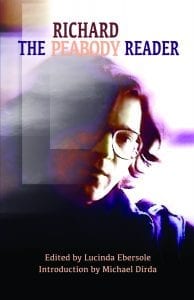“Main Character: Richard Peabody has devoted his life to Washington’s writers. At what cost?”
In 2011 Lora Engdahl wrote a long feature article on Richard Peabody for the Washington Post, exploring his countless contributions to DC’s literary brood. Richard Peabody has not only been patron saint to the arts (what with his magazine, Gargoyle, and his press, Paycock), but also a Socratic figure and mentor to many young writers just finding their sea legs–it is with great satisfaction we might read the names of people, now household, who got their start in Gargoyle. This is all to say that Lora’s lovely examination of Richard is as relevant today as it was in 2011 and maybe even more so. Richard is honored in the first book of our Legacy Series, The Richard Peabody Reader, which is a compendium of his working career, featuring poetry, short prose, and a novella.
Read the full article from WAPO here
A Long Excerpt:
 Richard Peabody has spent most of his adult life nurturing and promoting Washington’s literary output. Gargoyle, a thick doorstop of a literary magazine that he has published since 1976, has amassed a list of distinguished contributors, including eight National Poetry Series winners, five National Book Award winners, three PEN/Faulkner winners, three Pulitzer Prize winners, and winners of more than a dozen other honors. And he can count at least 30 former university, Writer’s Center and private creative writing students who have gone on to sell screenplays or publish books, including many with the most prestigious New York publishing houses. So it was with some displeasure that he stood at the back of the auditorium of the Montgomery College Theatre Arts Building in Rockville last fall listening to Washington Post book critic Jonathan Yardley inadvertently disparage his life’s work.
Richard Peabody has spent most of his adult life nurturing and promoting Washington’s literary output. Gargoyle, a thick doorstop of a literary magazine that he has published since 1976, has amassed a list of distinguished contributors, including eight National Poetry Series winners, five National Book Award winners, three PEN/Faulkner winners, three Pulitzer Prize winners, and winners of more than a dozen other honors. And he can count at least 30 former university, Writer’s Center and private creative writing students who have gone on to sell screenplays or publish books, including many with the most prestigious New York publishing houses. So it was with some displeasure that he stood at the back of the auditorium of the Montgomery College Theatre Arts Building in Rockville last fall listening to Washington Post book critic Jonathan Yardley inadvertently disparage his life’s work.
“The fact of the matter is that the number of respected, certifiably serious novelists now at work within the District of Columbia is embarrassingly small,” said Yardley, the keynote speaker at the 15th annual F. Scott Fitzgerald Literary Conference. “By the District of Columbia, I of course include its suburbs.”
“A further fact of the matter is that the ‘Washington novel’ … has yet to make a notable contribution to American literature. In fact, it hasn’t made any contribution at all.”
According to Yardley, Washington’s enduring status as a literary backwater derives from the lack of an “indigenous literary community.” Many of the serious fiction writers living here came from elsewhere, while writers with roots deep enough to produce the kind of stellar place-based fiction that puts a literary community on the map have failed to explore the narrative riches to be found in the lives of ordinary Washingtonians.
“… I do have some hope, though, that this is in the process of changing,” he continued, citing a handful of writers of real achievement and promise. They included people writing about life within the African American community (Marita Golden, Edward P. Jones and Danielle Evans), the intersection between white and black communities (Gary Krist, George Pelecanos and Dinaw Mengestu), life in suburbia (Susan Coll and Julia Slavin) and gay Washington (Andrew Holleran). Still, most of the best literary fiction of the day is being written outside of the United States, Yardley declared in the question-and-answer session after his speech.
Peabody, 59, who was slated to present the short story contest winners that afternoon, leaned against the wall with his arms folded across his chest, sharing rueful comments with Kim Roberts, a local poet and editor of Beltway Poetry Quarterly who would spend much of her time on a panel later that day extolling the merits of literary Washington.
chest, sharing rueful comments with Kim Roberts, a local poet and editor of Beltway Poetry Quarterly who would spend much of her time on a panel later that day extolling the merits of literary Washington.
As he recalled later, he and Roberts “were just marveling at that disconnect between life as we see it in the trenches and lit life as Yardley sees it.
“When he was going on about Julia Slavin, this new writer, I just had to laugh,” he says. “Julia was my student years ago.”
Coll and Slavin are part of a vast orbit of Washington writers Peabody has taught or published in his 35-year career as a teacher, freelance book doctor, small press publisher and editor of Gargoyle. In the working literary community, the talents of these writers, as well as those of writers such as Jones and Mengestu, were known before they made a name for themselves, Peabody explains.
“I understand why he said what he said,” Peabody says. “Those writers are new to him, and my focus is where his focus is not. I have spent most of my life going to bat for Washington, D.C., and I’m a native, and I care about the home team. I’ve tried to be one of the people who paid attention and kept it going.”